ZipPy on Truffle
Wei Zhang
University of California, Irvine
is?
-
Python 3 using Truffle
-
80% language completeness
-
https://bitbucket.org/ssllab/zippy

Trufflization
Generators
Performance
Numeric Types

CPython
ZipPy


Using Truffle DSL
@Specialization(order = 0)
int doBoolean(boolean left, boolean right) {
final int leftInt = left ? 1 : 0;
final int rightInt = right ? 1 : 0;
return leftInt + rightInt;
}
@Specialization(rewriteOn = ArithmeticException.class, order = 1)
int doBoolean(int left, boolean right) {
final int rightInt = right ? 1 : 0;
return ExactMath.addExact(left, rightInt);
}
@Specialization(rewriteOn = ArithmeticException.class, order = 2)
int doBoolean(boolean left, int right) {
final int leftInt = left ? 1 : 0;
return ExactMath.addExact(leftInt, right);
}
@Specialization(rewriteOn = ArithmeticException.class, order = 5)
int doInteger(int left, int right) {
return ExactMath.addExact(left, right);
}
@Specialization(order = 6)
BigInteger doIntegerBigInteger(int left, BigInteger right) {
return BigInteger.valueOf(left).add(right);
}
@Specialization(order = 7)
BigInteger doBigIntegerInteger(BigInteger left, int right) {
return left.add(BigInteger.valueOf(right));
}
@Specialization(order = 10)
BigInteger doBigInteger(BigInteger left, BigInteger right) {
return left.add(right);
}
@Specialization(order = 13)
double doDoubleBoolean(double left, boolean right) {
final double rightDouble = right ? 1.0 : 0.0;
return left + rightDouble;
}
@Specialization(order = 14)
double doDoubleBoolean(boolean left, double right) {
final double leftDouble = left ? 1.0 : 0.0;
return leftDouble + right;
}
@Specialization(order = 15)
double doDoubleInt(double left, int right) {
return left + right;
}
@Specialization(order = 16)
double doDoubleInt(int left, double right) {
return left + right;
}
@Specialization(order = 20)
double doDouble(double left, double right) {
return left + right;
}Sequence Types
-
range: generate indices
-
list: mutable, likely homogeneous
-
tuple: immutable, heterogeneous
for range loop
def sum(n):
ttl = 0
for i in range(n):
ttl += i
return ttl @Specialization(order = 1)
public Object doPRange(VirtualFrame frame, PRangeIterator range) {
final int start = range.getStart();
final int stop = range.getStop();
final int step = range.getStep();
for (int i = start; i < stop; i += step) {
((WriteNode) target).executeWrite(frame, i);
body.executeVoid(frame);
}
return PNone.NONE;
}for range loop
def sum(n):
ttl = 0
for i in range(n):
ttl += i
return ttl public int sum(int n) {
int ttl = 0;
for (int i = 0; i < n; i ++) {
ttl += i;
}
return ttl;
}for range loop
def sum(n):
ttl = 0
for i in range(n):
ttl += i
return ttl jmp L7
L6: mov ecx, edx
add ecx, ebp
jo L8
mov edx, ebp
incl edx
mov esi, ebp
mov ebp, edx
mov edx, ecx
L7: cmp eax, ebp
jle L9
jmp L6
L8: call deoptimize()
L9:List Storages
def makelist(n):
lst = []
for i in range(n):
lst.append(i)
return lst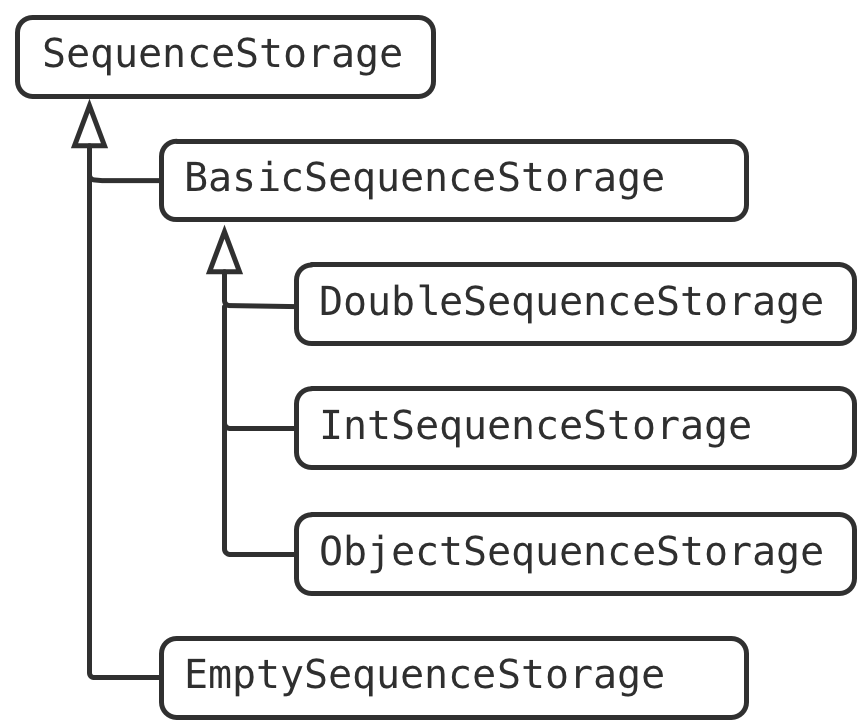
List Storages
def makelist(n):
lst = []
for i in range(n):
lst.append(i)
return lst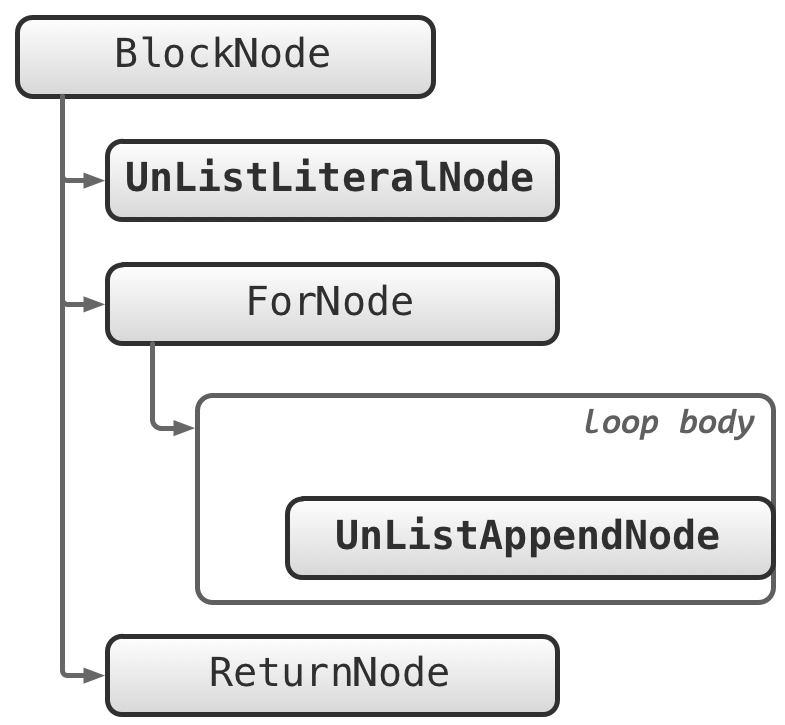
List Storages
def makelist(n):
lst = []
for i in range(n):
lst.append(i)
return lst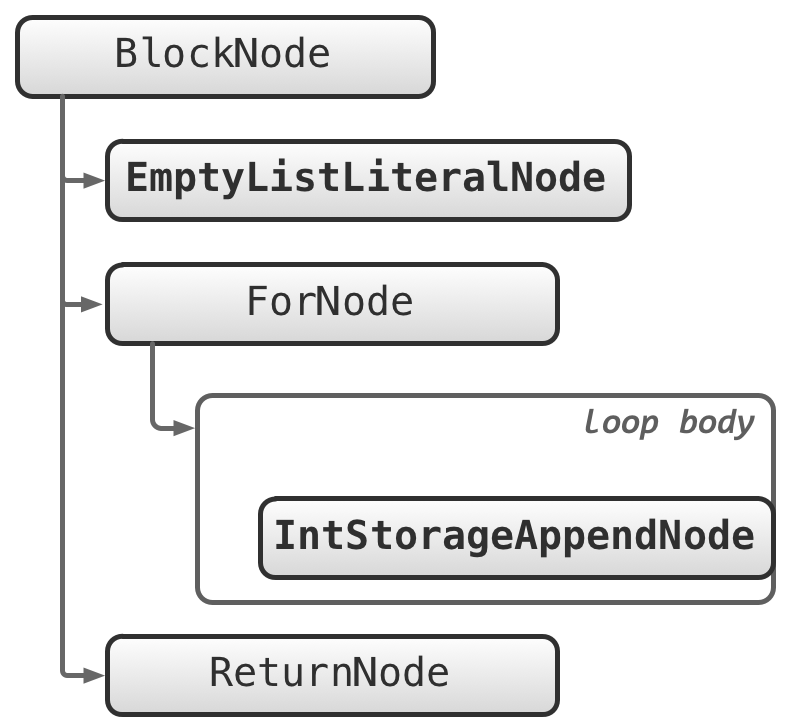
List Storages
def makelist(n):
lst = []
for i in range(n):
lst.append(i)
return lst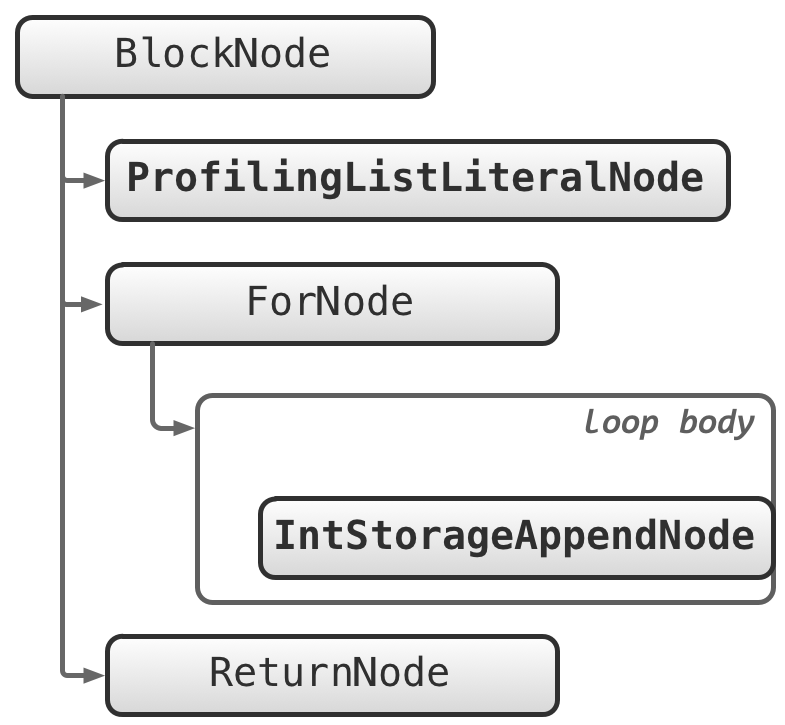
Object Model
class Tofu:
pass
class SpicyTofu(Tofu):
def __init__(self, c):
self.c = c
class MapoTofu(SpicyTofu):
def __init__(self, c, m):
SpicyTofu.__init__(self,c)
self.m = m
Object Model
class Tofu:
pass
class SpicyTofu(Tofu):
def __init__(self, c):
self.c = c
class MapoTofu(SpicyTofu):
def __init__(self, c, m):
SpicyTofu.__init__(self,c)
self.m = mpublic class FixedPythonObjectStorage
extends PythonObject {
protected Object[] arrayObjects;
protected int primitiveInt0;
protected int primitiveInt1;
protected int primitiveInt2;
protected int primitiveInt3;
protected int primitiveInt4;
protected double primitiveDouble0;
protected double primitiveDouble1;
protected double primitiveDouble2;
protected double primitiveDouble3;
protected double primitiveDouble4;
protected Object fieldObject0;
protected Object fieldObject1;
protected Object fieldObject2;
protected Object fieldObject3;
protected Object fieldObject4;
...Object Model
class Tofu:
pass
class SpicyTofu(Tofu):
def __init__(self, c):
self.c = c
class MapoTofu(SpicyTofu):
def __init__(self, c, m):
SpicyTofu.__init__(self,c)
self.m = mpublic class MapoTofuObjectStorage
extends PythonObject {
protected Object[] arrayObjects;
protected int cInt;
protected int mInt;
...Generators
def producer(n):
for i in range(n):
yield i
for i in producer(3):
print(i)
# 0, 1, 2
g = producer(3)
try:
while True:
print(g.__next__())
except StopIteration:
pass
# 0, 1, 2Generator Expressions
n = 3
g =(x for x in range(n))
sum(g)
# 3
def _producer():
for x in range(n):
yield x
_producer()
Execution Order

The Problems?
-
suspend and resume prevent frame optimizations
-
the __next__ call is expensive
-
90% of the top 50 Python projects on PyPI and GitHub use generators
Bytecode Interpreter
- iterative
- store control-flow state in bytecode index
AST
Interpreter
- recursive
- store control-flow state on the call stack
Generator AST
class WhileNode extends PNode {
protected ConditionNode condition;
protected PNode body;
public Object execute(Frame frame) {
try {
while(condition.execute(frame)) {
body.execute(frame);
}
} catch (BreakException e) {
// break the loop
}
return PNone.NONE;
}
}class GenWhileNode extends WhileNode {
private final int flagSlot;
public Object execute(Frame frame) {
try {
while(isActive(frame) ||
condition.execute(frame)) {
setActive(frame, true)
body.execute(frame);
setActive(frame, false);
}
} catch (BreakException e) {
setActive(frame, false);
}
return PNone.NONE;
}
}Generator AST
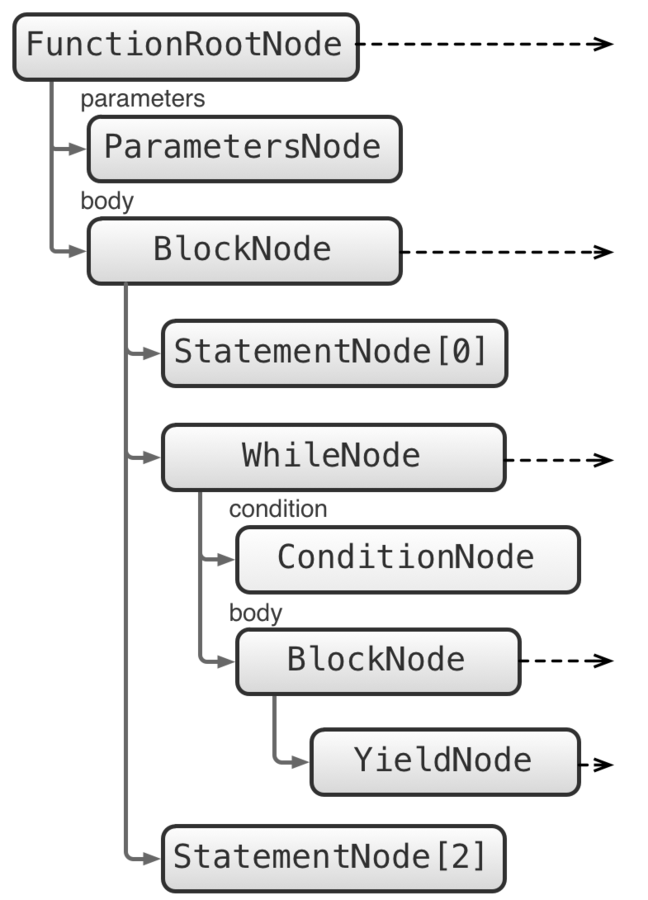
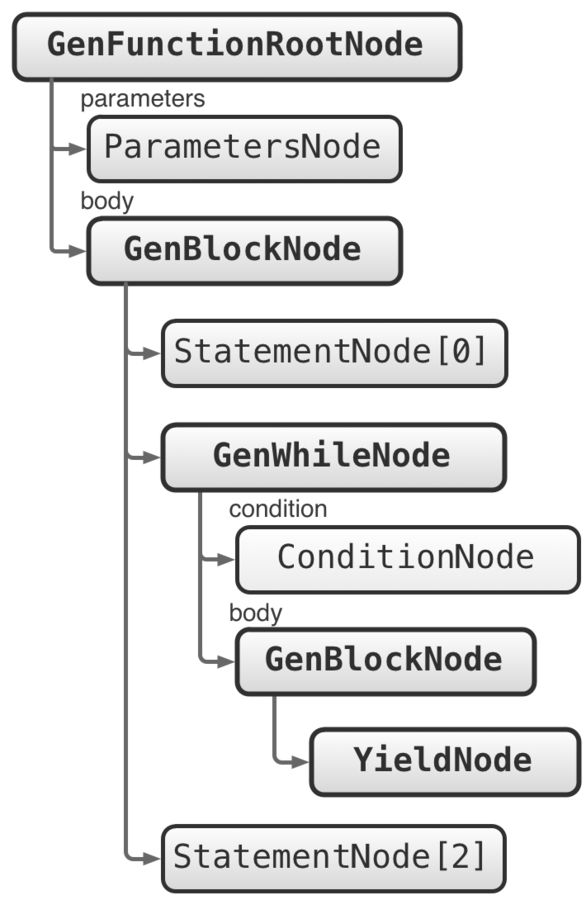
Generator Peeling

Generator Peeling

Generator Peeling
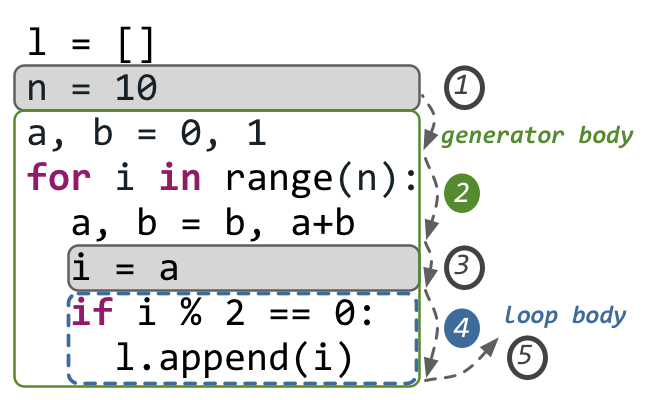
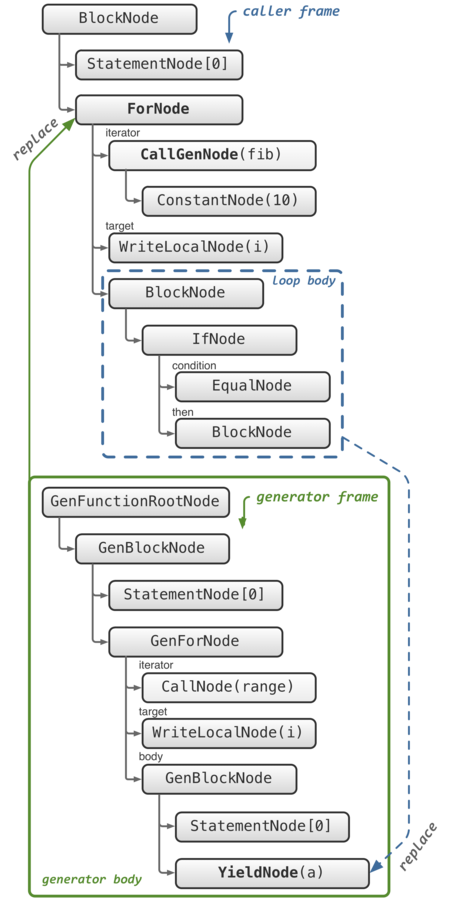
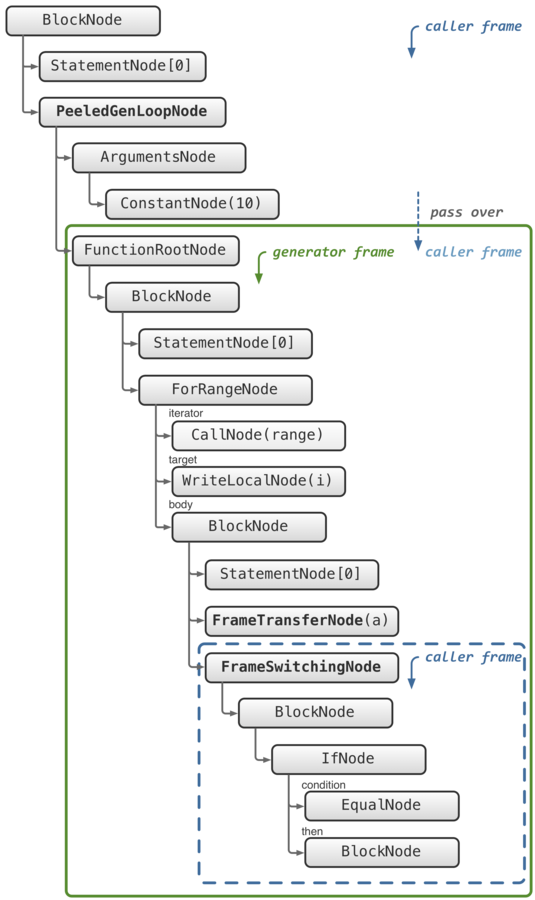
The End Result
-
caller frame and generator frame can be optimized
-
peeling inlines the __next__ call
-
no generator AST nodes
Benchmarking
-
against CPython, Jython, PyPy
-
measure peak performance
-
generator-bound and traditional benchmarks
Performance of Generator Benchmarks
Performance of Traditional Benchmarks
Lesson Learned
-
Trufflised AST is a good start
-
but there's a lot more...
Thanks!
多谢!
ZipPy on Truffle
By Wei Zhang
ZipPy on Truffle
- 3,276